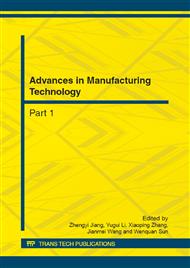p.198
p.202
p.206
p.210
p.215
p.220
p.224
p.229
p.233
An Analysis of Structure and Transforming Factors of Tacit Knowledge of Private Science and Technology Enterprise
Abstract:
Compared with explicit knowledge, tacit knowledge is much more perfect and can be used to create valuable things. The ability of exploiting and utilizing tacit knowledge has become the significant factor to success for an individual or an organization. Private Scientific and Technological Enterprise (PSTE), as one of the main parts of National Economy in China, desire to transfer the internal tacit knowledge into the productivity in the reality. In this paper, the nature of tacit knowledge will be analyzed. Besides that, the factors that restrict the share of tacit knowledge in PSTE will be analyzed in detailed from individual, group and organization these three aspects, all are based on the infrastructure of tacit knowledge.
Info:
Periodical:
Pages:
215-219
Citation:
Online since:
November 2012
Authors:
Price:
Сopyright:
© 2012 Trans Tech Publications Ltd. All Rights Reserved
Share:
Citation:


